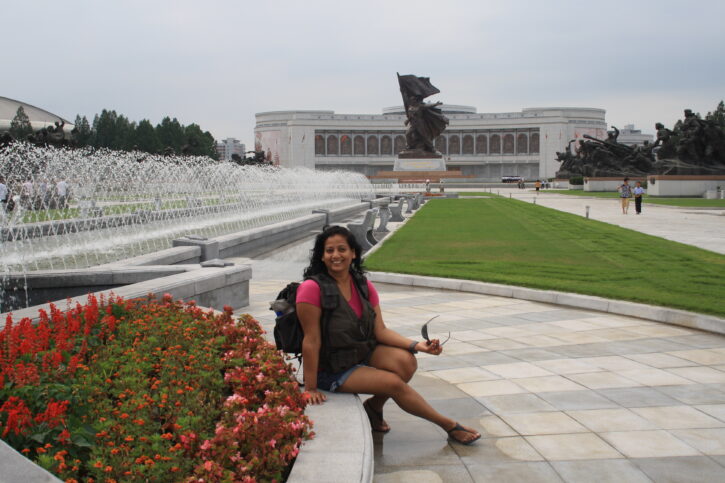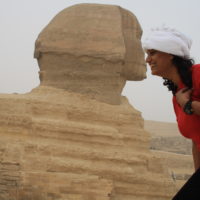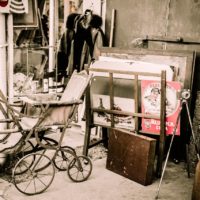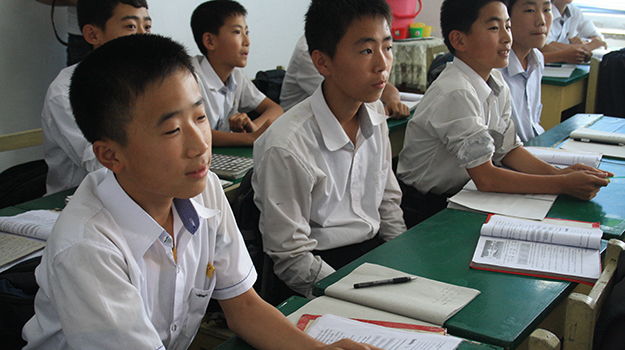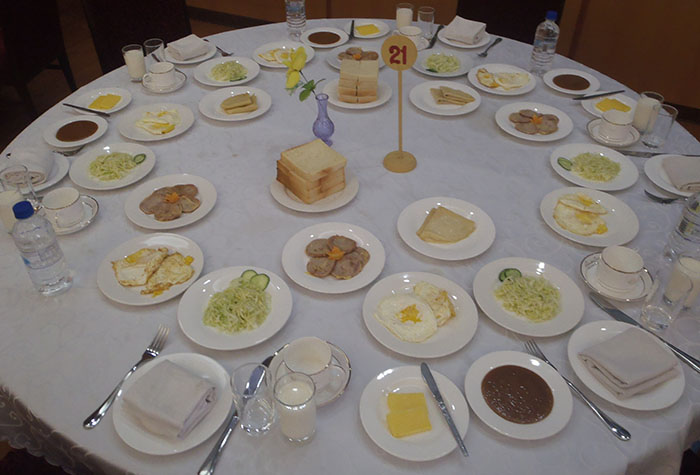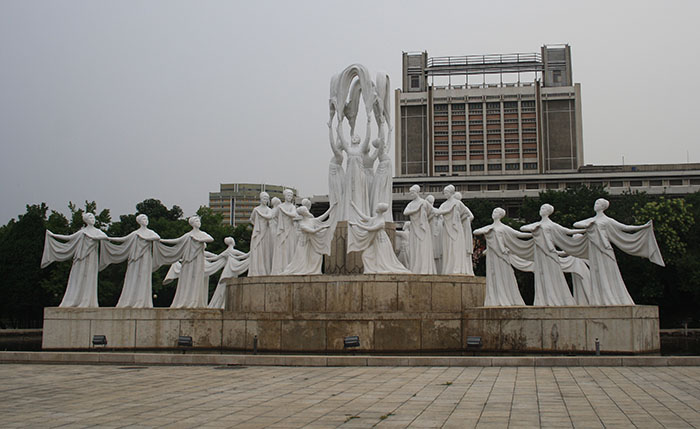It was getting dark rapidly. And with the darkness came the relief of having successfully spent another exciting day in Democratic People’s Republic of Korea (DPRK or North Korea) – a chance only a few thousand tourists get every year. But with that thought also came a sense of relief that no misfortune had befallen any of the sixty tourists who had been given permission to visit DPRK, one of the world’s most mysterious countries so far.
So far. That word was comforting. And we were already on Day 3.
For me, this was proving to be the most difficult type of trip. But I am sure, like all travelers, especially solo Asian women who celebrate freedom in their travels, I bit the regimented North Korean bullet and assured myself I was right in coming to DPRK.
In the last three days I had seen pretty much everything that had been decided for me to see – not the way I’d have liked for things to be, but that’s the way it was. Traveling was about learning to accept, right?
A legend of love
The city of Pyongyang was covered in darkness as we sped towards the hotel. Ms Deer (name changed), the head-guide picked up the mike. She was our head guide for a reason. She was slim, spoke very good English, was patient, knowledgeable of Korean history and was very beautiful. In her picking up the mike so close to darkness, we learnt that she could sing too. The mike wasn’t the most modern, but it was all we had. For her, that mike represented freedom because it gave her a voice – so what if she was singing to the thirty of us on the bus?
The bus raced towards the Yanggakdo Hotel, a special treat for us we were told. Yanggakdo International Hotel was the country’s most prestigious hotels sitting on Yanggak Island on Taedong River and our group was made to feel lucky to have been upgraded to stay in it.
“You can even make calls from there,” she told us pleasantly. While that cheered us up a little, she cleared her throat and blew into the mike.
“I will tell you about our famous folk song,” she began in her soft and melodious voice. “Once upon a time, a young couple who lived on a high mountain pass was forced to separate. The man took off and the bride leaned over the window and watched as he disappeared from sight into the dense forests. She sighed so deeply that the echoes were heard everywhere. That is how this song was born. It is a song of love, longing and hope. And desperation.”
We waited. This was by far the cheeriest thing we were about to witness.
“Aarirang, aarirang, arariyo
Aarirang gogaero neomeoganda…”
The bus fell silent, everyone trying to process what we’d just heard. If only the world outside her locked up country could hear her. I am not a judge of voices, but even to my untrained ears, this was priceless. Rare.
Confused with the stunned silence, she laughed a small laugh and said – “I will sing you an English song. Who likes Danny Boy?”
A round of applause went around. In her choices of songs, never mind the language, she expressed her real feelings. Longing. Like Aarirang.
There was a real sense of desire that the regime had been unable to break.
I had the good sense to record the song. Just in case you are wondering how, remember that you could take in mobile phones but not actually use it, because Wi-Fi is unheard of nor could you buy a local sim card. In North Korea, a phone is as good as your bar soap.
Only high level officials had internet access.
|
When I turned in for the night after enjoying an excellent dinner (perhaps rightfully deserved by thousands of it citizens) as Taedong River snaked into the darkness somewhere far below, I recalled the day’s highlights. And Ms Deer. She was in my thoughts all the time.
A belief that transcends reality
In the morning, we had toured the Mangyongdae Native House where eternal President Kim Il Sung was born. The surprisingly well-kept humble thatched house, the almost new pots and pans that hung on the walls, the “tub” in which he bathed as a child…everything had a sense of unrealism. It was here we were told about the Miracle Well.
I swear she looked at me when saying this. Perhaps she could connect with my culture more easily. As Asians, we do believe more in miracle waters and stones than Westerners do. She lingered by my side mostly, happy to answer my questions about magical waters, silently urging me on to be the first to try. However, this said magical well had a history that favoured or glorified the country’s rulers, but every so often, outsiders were allowed to drink from it too. As a celebration of long life.
She led us towards the well and with a sharp tug, drew up a small bucket of water. Picking up a half cup, she put it to her lips. Her eyes closed in reverence. She was possibly imagining that water washing away her fatigue and advancing age and restoring her vitality and youth. She clearly believed in it. Her belief transformed her. A small, peaceful smile appeared on her face. Out of curiosity, I followed suit, the first of the group.
I didn’t believe in reversing age, but I was thirsty.
I closed my eyes, like she had and tried to imagine myself turning younger and ebullient. When the cold, clear sweet water touched my lips, I was transformed, at least in my own imagination. It reminded me of the holy water I drank from countless holy places around the world, temples or churches. I have never felt so cleansed and revitalized. I am not sure if it was the water or Ms Deer’s faith but my thirst vanished.
“Our Great Leaders have drank from it for years. It is why they are always young and youthful and strong. It is why they are eternal.”
“Amen” someone whispered.
It was a wrong thing to say of course, because, in DPRK religion was discouraged. If anything, Juche philosophy was encouraged.
A representation of DPRK
I had about enough of the “Korean War”, bowing at the statues of Kim Il Sung and Kim Jong Il, the constant allusions to Americans as Imperialists, propaganda posters, the greatness of the demi gods, citizens with compulsory lapel pins, dictator-ish policewomen, the garishly modern Kumsusan Palace of the Sun, the desolate airport and the empty shell of the Ryugong Hotel… but I tried to see the brighter side.
There would be plenty of stories to tell for years to come. Like being able to stand on the demarcation line between North and South Korea at the DMZ and for an instant wishing to just cross the line…
Considering the lack of access to the real world, people’s life revolved around Korea and its great rulers. The version of Korea they knew or were taught was unimaginably false. Unfortunately that was the information passed down to us. But since I was not visiting DPRK to double-check their claims, I accepted it all with a smile and bowed at every statue of Great Leaders and smiled for the videographer at every given chance. Oh yes – were being recorded all the time – and would soon make it to the National Television.
I particularly remember the tram ride. I suppose I became the only person to ever hang out of the tram and lived to share my picture of it. It is true that solo Indian women travelers to DPRK were a rarity. I must have looked very Bollywood-ish to the locals hurrying away with their lapel pins trying to hide their astonishment and smiles.
We also had the “luck” to go on a short train ride. The stations deep underground were quite monumental – rather like in the Soviet era. But then DPRK was a strong ally of USSR once upon a time. The influence was evident.
Let us just agree that North Korea is a dictatorship of the most extreme kind, the country is closed off to the world, is secretive, doesn’t believe in freedom and has a version of history hard to digest – but that is not what I am going to talk about.
We were told (and no way to reconfirm it), that everything was provided for in the country. Housing, food, education and medical assistance et all were state sponsored. People were happy just to work and get food coupons in return for the services to the state. The food was distributed through a Public Distribution System that calculated the exact amount of rice to be given per family while luxurious food items like noodles or pork was allowed few times a year. Kimchi and rice was a staple – and encouraged.
No one complained.
But every meal we had was a celebration of what DPRK denied its citizens. Food was in plenty and the variety sheer mind boggling. For a country continually plagued by famine, there was surprisingly large amount of food on our table. Ms Deer was never allowed to share the table with us though. I am certain she hoped for a change in her meal pattern once in a while.
The glass noodles, kimchi and barbeque were superb. So was the beer. Sometimes all you need is beer and folklore to bind you to a place or to forget the atrocities inflicted upon fellow human being as evidenced in the Korean War Museum.
Beer was the only luxury that the locals enjoyed. Beer No 2 was particularly good and I hope it helped the locals forget, even if for just a moment, that they were like us – the outsiders. Free.
Memories of golden voice
In all honesty, even when I look back, she is all I think of. There is never a moment when I think of DPRK and Ms Deer doesn’t form a part of that memory. My thoughts always come back to her. She represents the country and what I want to remember a country by. Not the Arch of Triumph or Juche Tower or the grand monument of Mansudae Hill or its swanky underground stations – but by the hope in her voice.
In the music of Aarirang is hope. In it is a a common thread shared by every folklore around the world. A story that speaks of loss and hope.
Of Love.

